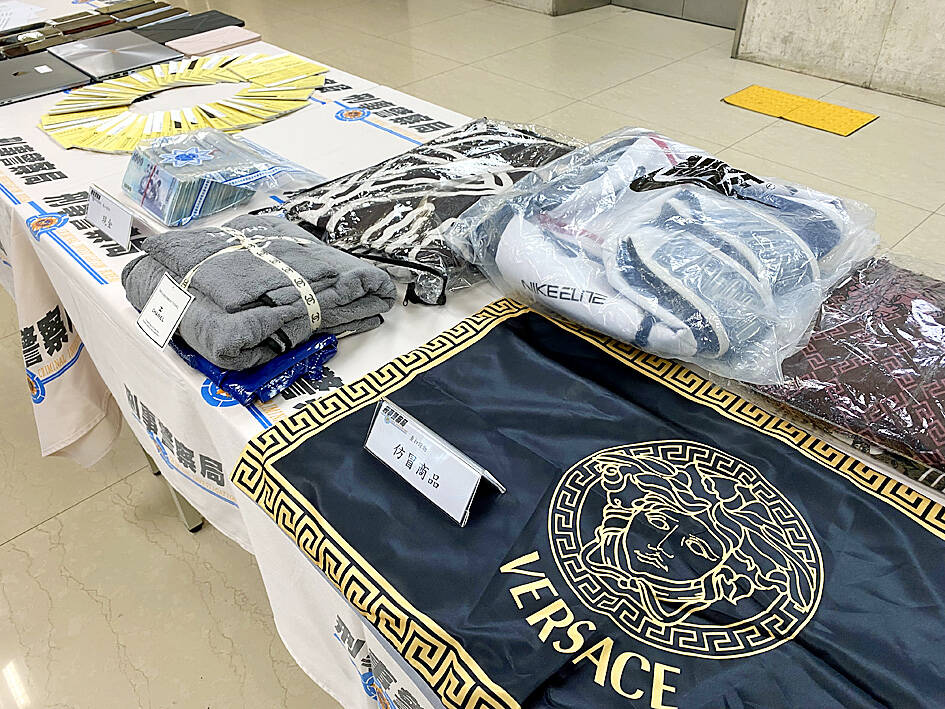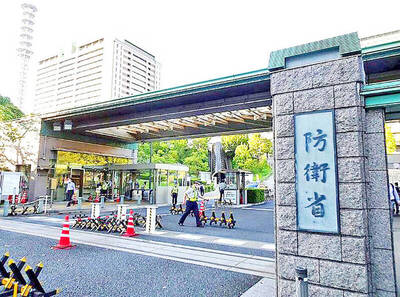Ten people have been detained in connection with a scheme that used rented accounts on Shopee, a Singapore-based e-commerce platform, to sell over NT$300 million (US$10 million) in counterfeit goods from China in Taiwan, the Criminal Investigation Bureau (CIB) said yesterday.
The CIB said the scheme was orchestrated by a 54-year- old man surnamed Hu (胡), who is currently wanted for fraud and economic crimes but has fled to China.
Hu allegedly directed a woman surnamed Chang (張) to set up a company in Taiwan and recruit a man surnamed Wang (王) and others to rent Shopee accounts for NT $2,000 plus 1-2 percent of sales, according to Li Yang-chi (李泱輯), head of the CIB’s 2nd Investigation Corps.

Photo: CNA
Li said the group commandeered 290 such accounts between January 2024 and June 2025, generating over NT$300 million in sales and at least NT$6 million in illegal gains.
Counterfeit Chanel, Versace, Louis Vuitton, Nike, Sanrio and Crayon Shin-chan items were imported from China and stored in a warehouse in Taoyuan’s Luzhu District before being mailed to customers in Taiwan, the CIB said.
The proceeds were first sent to the shell company and then remitted to China by Hu’s sister, also surnamed Hu (胡), and a woman surnamed Ssu (斯), the bureau added.
To disguise the illegal money flows, Chang ordered subordinates to create additional dummy firms and had employees sign confidentiality agreements, the CIB alleged.
On June 12, investigators searched five commercial sites and 13 residences in Taipei and New Taipei, Taoyuan, Taichung and Kaohsiung, arresting the 10 suspects, it said.
The case was transferred to the New Taipei District Prosecutors Office where bail for the suspects was set at between NT$100,000 and NT$500,000, it said.
Hu’s sister and Ssu -- who frequently traveled to China -- were also barred from leaving Taiwan, it said.
The scheme violated Taiwan’s Money Laundering Control Act (洗錢防制法), Banking Act (銀行法) and Trademark Act (商標法) and posed "national security risks" by flooding the Taiwanese market with low-quality prohibited goods, the bureau said.
The CIB reminded the public that renting or lending personal financial or payment accounts is illegal under the Money Laundering Control Act.

LOOKING NORTH: The base would enhance the military’s awareness of activities in the Bashi Channel, which China Coast Guard ships have been frequenting, an expert said The Philippine Navy on Thursday last week inaugurated a forward operating base in the country’s northern most province of Batanes, which at 185km from Taiwan would be strategically important in a military conflict in the Taiwan Strait. The Philippine Daily Inquirer quoted Northern Luzon Command Commander Lieutenant General Fernyl Buca as saying that the base in Mahatao would bolster the country’s northern defenses and response capabilities. The base is also a response to the “irregular presence this month of armed” of China Coast Guard vessels frequenting the Bashi Channel in the Luzon Strait just south of Taiwan, the paper reported, citing a

A total lunar eclipse, an astronomical event often referred to as a “blood moon,” would be visible to sky watchers in Taiwan starting just before midnight on Sunday night, the Taipei Astronomical Museum said. The phenomenon is also called “blood moon” due to the reddish-orange hue it takes on as the Earth passes directly between the sun and the moon, completely blocking direct sunlight from reaching the lunar surface. The only light is refracted by the Earth’s atmosphere, and its red wavelengths are bent toward the moon, illuminating it in a dramatic crimson light. Describing the event as the most important astronomical phenomenon

ENHANCING DETERRENCE: Stationing the missiles in Kyushu would allow Japan to cover waters near Taiwan and China’s coastal areas without any logistical difficulties Japan is to deploy extended-range anti-ship missiles at a Ground Self-Defense Force base in Kumamoto to bolster its defenses, the Yomiuri Shimbun reported on Saturday. The upgraded Type 12 surface-to-ship missile, with a range of more than 1,000km, would be capable of striking targets in the Taiwan Strait and along China’s coast. Originally limited to a few hundred kilometers, the Type 12 was recently modernized ahead of schedule. Deployment, initially slated for next year, has been accelerated after the upgrade was completed sooner than expected, the newspaper said. Stationing the missiles in Kyushu would allow Japan to cover waters near Taiwan and

The presence of Taiwanese politicians at China’s military parade tomorrow would send the wrong message to Beijing and the international community about Taiwan’s sovereignty and democracy, a national security official said yesterday. China is to hold the parade tomorrow to mark the 80th anniversary of Japan’s surrender in World War II. By bringing together leaders of “anti-West” governments such as Russia, North Korea, Iran and Belarus, the parade aims to project a symbolic image of an alliance that is cohesive and unbending against Western countries, the national security official said, speaking on condition of anonymity. Former Chinese Nationalist Party (KMT) chairwoman Hung Hsiu-chu